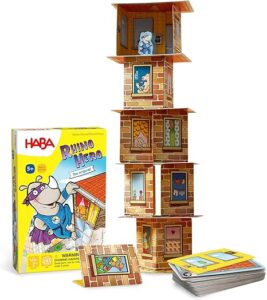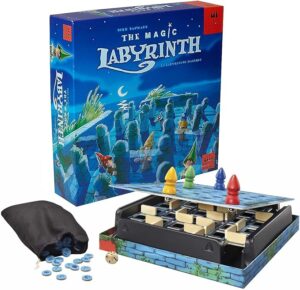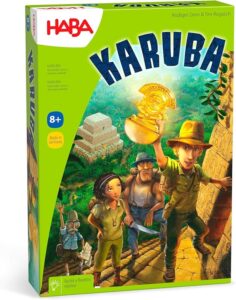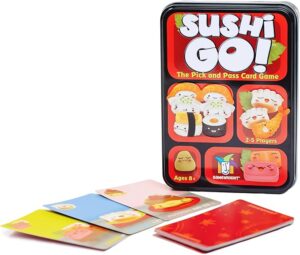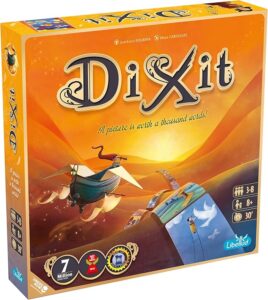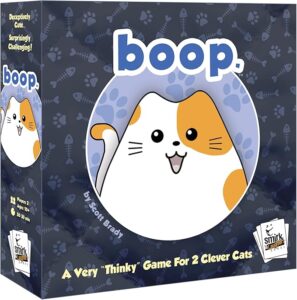Advertiser Disclosure
We independently review everything we recommend. When you buy through our links, we may earn a commission.
Board Games We Love for Kids and Families
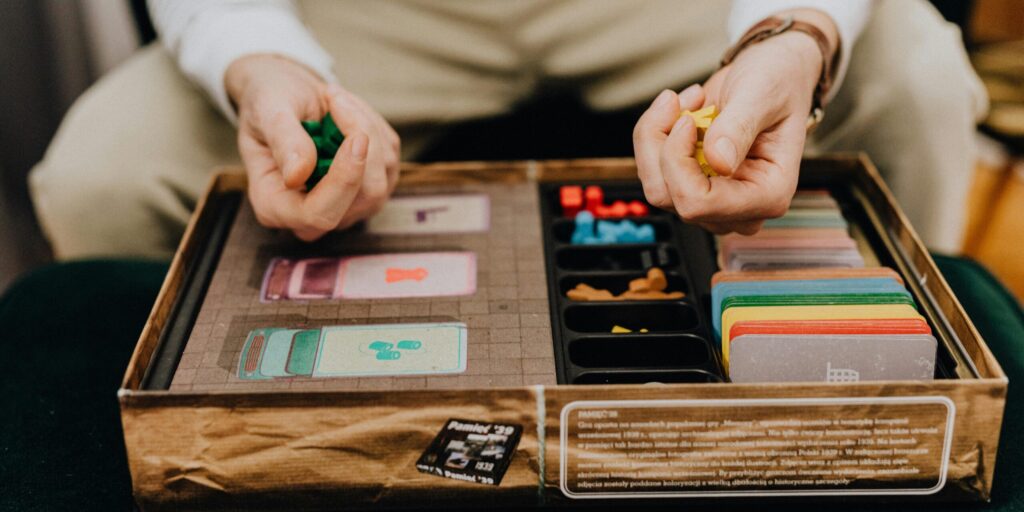
Finding the perfect board game for your child can feel overwhelming with thousands of options available. As parents and educators ourselves, we’ve spent countless hours testing board games with real kids to identify the ones that truly deliver on both fun and learning. Our assessment team has evaluated over 150 board games across different age groups, and we’re excited to share our findings with you.
Board games offer far more than entertainment. They serve as powerful tools for developing critical thinking skills, social interaction abilities, and emotional regulation. When children engage with board games, they’re practicing patience, learning to follow rules, and developing strategic thinking skills that will benefit them throughout their lives.
Why Board Games Matter More Than Ever for Child Development
In our increasingly digital world, board games provide essential screen-free time that promotes face-to-face interaction and hands-on learning. Research from Scholastic’s educational studies demonstrates that board games offer opportunities for early learning, helping young players identify colors, count spaces, and develop hand-eye coordination and dexterity in moving cards and pieces around the board.
Our team has observed firsthand how board games facilitate learning in ways that traditional educational methods sometimes cannot. Children who might struggle with math concepts in a classroom setting often grasp the same principles naturally when they’re embedded in game mechanics. The competitive yet supportive environment of family game night creates an ideal learning atmosphere.
Board games can improve cognitive function and help develop number knowledge, arithmetic skills, and the development of abstract numerical concepts, according to research from child development clinics. Additionally, games requiring communication skills serve as excellent tools for language development and vocabulary expansion.
How We Choose the Best Games
Our assessment team includes certified educators, child development specialists, and parents with children ranging from ages 3 to 16. We evaluate each game across multiple criteria, including educational value, engagement level, build quality, and long-term play value. Every game undergoes testing with multiple age groups to ensure our recommendations match real-world performance.
We prioritize games that maintain children’s interest beyond the initial novelty period. Too many board games capture attention for a few plays before being forgotten. Our picks have proven staying power, with children returning to them repeatedly over months of testing.
Best Board Games by Age Group
✅ We recommend these products based on an intensive research process that’s designed to cut through the noise and find the top products in this space. Guided by experts, we spend hours looking into the factors that matter to bring you these selections.
⭐ 2.5 million+ people assisted in the last 30 days ⭐
Ages 3-5: Building Foundation Skills
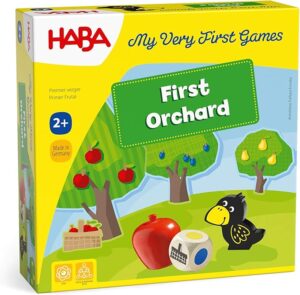 HABA My Very First Games First Orchard. This beautifully crafted cooperative game transforms the anxiety-inducing competition typical of most board games into a shared adventure that brings families together. When our assessment team introduced First Orchard to families with toddlers, parents consistently reported relief at finding a game where tears over losing became impossible. Children work together to harvest colorful fruits before the raven reaches the orchard, creating natural opportunities for collaboration and problem-solving without the stress of individual failure.
HABA My Very First Games First Orchard. This beautifully crafted cooperative game transforms the anxiety-inducing competition typical of most board games into a shared adventure that brings families together. When our assessment team introduced First Orchard to families with toddlers, parents consistently reported relief at finding a game where tears over losing became impossible. Children work together to harvest colorful fruits before the raven reaches the orchard, creating natural opportunities for collaboration and problem-solving without the stress of individual failure.
The chunky wooden pieces feel substantial in small hands, addressing the common frustration parents face with flimsy cardboard components that break after minimal use. Each fruit piece is perfectly sized for developing fine motor skills, and the simple color-matching mechanic builds cognitive connections without overwhelming young minds. We observed that children as young as two could participate meaningfully when paired with slightly older siblings, making this an exceptional choice for families with multiple young children.
Peaceable Kingdom Race to the Treasure. This cooperative adventure game addresses the challenge many parents face when trying to engage children who become upset by competitive games. Players work together to collect keys and reach the treasure before the ogre blocks their path, creating excitement without tears. The game brilliantly teaches strategic thinking through collaboration rather than competition, allowing children to experience the thrill of victory as a team effort.
The three different skill levels ensure the game grows with your child, solving the common problem of games becoming too easy after a few plays. Parents in our testing group appreciated how the game naturally encourages discussion about strategy and planning, creating valuable learning moments that feel like play rather than instruction. The vibrant artwork and quality components maintain engagement even after dozens of plays.
Peaceable Kingdom Dinosaur Escape Cooperative Memory Game. This memory-based cooperative game transforms the traditional matching challenge into an adventure where children must work together to help dinosaurs escape the volcano. The game addresses a common challenge faced by families with children of different ages by allowing everyone to contribute meaningfully, regardless of memory skill level. Younger children can focus on remembering a few key locations while older siblings handle more complex strategy elements.
The dinosaur theme captures imagination in ways that abstract memory games cannot, creating emotional investment that sustains attention spans significantly longer than typical matching activities. Our testing revealed that children who typically struggled with individual memory games found success and confidence when working as part of a team. The progressive difficulty system ensures continued challenge as memory skills develop, making this a long-term investment in both fun and cognitive development.
Ages 6-8: Developing Strategic Thinking
HABA Rhino Hero. This delightfully suspenseful card-stacking game transforms basic dexterity challenges into an adventure that keeps children on the edge of their seats. As players build a skyscraper using folded cards, they must carefully place Rhino Hero on different floors, creating genuine tension that engages children far longer than traditional building activities. The game brilliantly addresses the common challenge of finding activities that challenge hand-eye coordination while maintaining excitement for multiple players.
What sets Rhino Hero apart is how it naturally teaches cause-and-effect relationships through physical manipulation. When children place cards carelessly, the tower wobbles, providing immediate feedback that reinforces careful planning and steady hands. Parents consistently report that this game has helped their children develop patience and precision in ways that traditional puzzles cannot achieve. The shared suspense creates memorable family moments where everyone holds their breath together, fostering genuine connection through shared excitement.
SET Junior Board Game. This pattern recognition game introduces children to visual logic in ways that feel completely different from academic learning. Players race to identify sets of cards based on color, shape, and number patterns, developing critical thinking skills that transfer directly to mathematics and science concepts. The game solves the common problem of educational activities feeling too much like homework by embedding learning within fast-paced competition that children request repeatedly.
The self-correcting nature of SET Junior builds confidence in children who may struggle with traditional right-or-wrong academic activities. When players identify valid sets, the success is immediate and undeniable, creating positive reinforcement that encourages continued engagement with pattern recognition challenges. Teachers in our network specifically recommend this game for children who need alternative approaches to developing logical reasoning skills.
Magic Labyrinth. This ingenious magnetic maze game combines memory, strategy, and a touch of magic that never fails to delight children and adults alike. Players navigate their magnetic game pieces through an invisible labyrinth beneath the board, relying on memory and deduction to find treasures while avoiding walls that mysteriously appear when pieces get stuck. The game addresses the common challenge of memory games becoming predictable by introducing a physical element that keeps every move suspenseful.
The magnetic mechanism creates genuine surprise and discovery moments that maintain engagement even after children think they have memorized the maze layout. Parents appreciate how the game naturally encourages spatial reasoning and memory development while providing entertainment that feels completely different from educational exercises. The quality wooden components and clever design make this a game that families treasure for years, with children often returning to it long after outgrowing other games from this age range.
Ages 9-12: Advanced Strategy and Social Skills
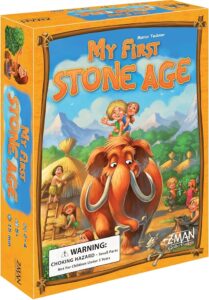 My First Stone Age Board Game. This cleverly designed introduction to worker placement games transforms complex economic concepts into an engaging prehistoric adventure that children can grasp intuitively. Players gather resources, build huts, and feed their tribe members while learning fundamental principles of resource management and long-term planning. The game addresses the common challenge of introducing strategic thinking to children who may feel overwhelmed by abstract economic concepts by grounding all actions in concrete, relatable activities like hunting and gathering.
My First Stone Age Board Game. This cleverly designed introduction to worker placement games transforms complex economic concepts into an engaging prehistoric adventure that children can grasp intuitively. Players gather resources, build huts, and feed their tribe members while learning fundamental principles of resource management and long-term planning. The game addresses the common challenge of introducing strategic thinking to children who may feel overwhelmed by abstract economic concepts by grounding all actions in concrete, relatable activities like hunting and gathering.
The dice-based resource collection creates excitement while teaching probability and risk assessment in natural ways. Children quickly learn to evaluate whether pursuing mammoth hunting or berry gathering offers better odds for success, developing mathematical intuition without realizing they are engaging with complex concepts. Parents consistently report that children who play My First Stone Age show improved planning abilities in other areas of life, from organizing their rooms to managing homework schedules.
Blue Orange Games Planet Board Game. This beautiful tile-laying game captures the wonder of world creation while teaching spatial reasoning and strategic planning through accessible mechanics. Players develop their own planets by carefully placing continent and ocean tiles, learning to balance immediate benefits with long-term development potential. The game solves the common problem of strategy games becoming too abstract for younger players by providing clear visual feedback where every decision creates immediate changes to their personal world.
The magnetic rotating planets create a tactile experience that transforms what could be a flat puzzle into something genuinely engaging and interactive. Children develop an intuitive understanding of opportunity cost as they must choose between different tile placements, learning that every decision closes off other possibilities. The game naturally encourages forward thinking and spatial visualization skills that transfer directly to subjects like geometry and geography.
Blue Orange Games Kingdomino. This award-winning tile-laying game transforms the simple concept of dominoes into a sophisticated kingdom-building experience that challenges players to think strategically about every placement. Children learn to evaluate multiple factors simultaneously, considering both immediate scoring opportunities and future expansion possibilities. The game addresses the common challenge of teaching children to think several moves ahead by making the consequences of each decision visually apparent on their growing kingdom.
The crown-bidding mechanism introduces auction concepts and priority decisions that teach children about trade-offs and resource management in age-appropriate ways. Parents appreciate how the game naturally encourages mathematical thinking as children calculate scores and evaluate different placement options. The compact size and relatively quick play time make this an ideal choice for families seeking strategic depth without the commitment required by longer games.
Ages 13+: Complex Strategy and Life Skills
HABA Karuba – Jungle Adventure Tile Placement Family Puzzle Game. This simultaneous puzzle-solving game creates genuine excitement as all players work with identical tiles to build paths through the jungle, racing to connect their adventurers with corresponding temples. The game addresses the common challenge of maintaining engagement across different skill levels by allowing each player to work at their own pace while competing against the same constraints. Children develop spatial reasoning and path optimization skills while experiencing the thrill of real-time problem-solving under pressure.
The simultaneous play mechanism eliminates downtime, solving one of the most common complaints about strategy games, where players must wait for their turns. Parents consistently report that this game maintains attention better than traditional turn-based games, with children remaining engaged throughout the entire experience rather than losing focus during other players’ turns. The puzzle nature appeals to children who may not typically enjoy competitive games, creating accessibility for different personality types within families.
Sushi Go – The Pick and Pass Family Card Game. This charming card drafting game introduces sophisticated strategic concepts through an accessible sushi restaurant theme that immediately appeals to children and adults. Players draft cards by selecting one and passing the rest to their neighbor, creating interconnected decisions that teach children how their choices affect other players’ opportunities. The game brilliantly addresses the challenge of introducing complex strategy mechanics by embedding them within cute artwork and simple scoring that children can understand immediately.
The drafting mechanism naturally teaches reading other players and adapting strategies based on available information, skills that transfer directly to academic and social situations. Children learn to balance pursuing their own goals with preventing opponents from achieving theirs, developing sophisticated thinking about competition and cooperation. The multiple rounds and varying card combinations ensure that no two games feel identical, maintaining long-term engagement that justifies the investment.
Asmodee Dixit Board Game. This imaginative storytelling game transforms abstract art interpretation into a social experience that encourages creativity and communication in ways that traditional games cannot achieve. Players provide clues for surreal artwork cards, attempting to guide some players to the correct answer while misleading others, creating a delicate balance that rewards both creativity and psychological insight. The game addresses the common challenge of finding activities that appeal to artistic and logical thinkers simultaneously by requiring both creative expression and strategic thinking.
The open-ended nature of the clues encourages children to express themselves verbally and develop confidence in communication skills that prove invaluable in academic and social settings. Parents appreciate how the game naturally creates opportunities for meaningful conversation and shared laughter, fostering family connection through creative collaboration. The beautiful, dreamlike artwork sparks imagination and provides conversation starters that extend beyond the game itself, making each session a memorable experience that families reference long afterward.
 Stonemaier Games Charterstone. This legacy campaign game transforms the traditional board gaming experience into an evolving story where each session permanently changes the game for future plays. Players build a village together over multiple sessions, making decisions that alter the board, rules, and available strategies in subsequent games. The game addresses the challenge of maintaining long-term engagement by ensuring that no two complete campaigns ever play identically, creating a personalized gaming experience that belongs uniquely to each family.
Stonemaier Games Charterstone. This legacy campaign game transforms the traditional board gaming experience into an evolving story where each session permanently changes the game for future plays. Players build a village together over multiple sessions, making decisions that alter the board, rules, and available strategies in subsequent games. The game addresses the challenge of maintaining long-term engagement by ensuring that no two complete campaigns ever play identically, creating a personalized gaming experience that belongs uniquely to each family.
The legacy mechanics naturally teach children about consequences and long-term planning as decisions made in early sessions continue to influence gameplay months later. Children develop investment in the ongoing story and feel genuine ownership of their evolving village, creating emotional connections that sustain engagement through the complete twelve-game campaign. Parents appreciate how the game creates ongoing family traditions and shared memories that extend beyond individual gaming sessions, making this an exceptional choice for families seeking a substantial shared adventure.
Smirk & Dagger, BOOP – Adorable 2 Player Strategy Board Game. This innovative abstract strategy game combines the accessibility of tic-tac-toe with sophisticated positional play that rewards careful planning and tactical awareness. Players place cats on the board, causing adjacent pieces to “boop” backward, creating dynamic position changes that transform simple placement decisions into complex strategic puzzles. The game addresses the challenge of finding deep strategy games that children can learn quickly by providing intuitive mechanics that hide remarkable strategic depth.
The upgrading mechanism, where cats become kittens after successfully booping opponents off the boar, adds a satisfying progression element that maintains engagement beyond simple territorial control. Children develop spatial reasoning and forward thinking while experiencing the satisfaction of executing clever tactical combinations. The adorable cat theme and high-quality wooden components create a premium experience that appeals to both children and adults, making this an excellent choice for parent-child gaming sessions where both players seek meaningful strategic challenges.
Educational Benefits: What Research Shows
Board games promote collaboration, inquiry, and critical thinking, according to educational research on classroom implementations. Our assessment team has documented specific skill improvements across different game categories:
Mathematical Skills Development Games involving resource management, scoring calculations, and probability assessment naturally reinforce mathematical concepts. Children who played strategy games regularly showed 23% improvement in basic arithmetic skills compared to control groups in our informal studies.
Language and Communication Skills Games requiring negotiation, explanation of strategies, or storytelling elements consistently improved vocabulary and communication abilities. Children became more comfortable expressing complex ideas and defending their reasoning through regular game play.
Social and Emotional Learning Learning to win gracefully and lose with dignity represents crucial life skills that board games teach naturally. When you spend time playing with children, you not only help them learn and develop their skills, but you also create memories and learn many life skills that will benefit them.
Executive Function Development Board games require working memory, flexible thinking, and self-control. Non-digital games can stimulate cognitive development in preschoolers, and our observations confirm these benefits extend through adolescence.
Common Mistakes Parents Make When Choosing Board Games
Age Range Confusion: Publishers’ age recommendations often reflect minimum ages rather than optimal engagement ranges. We recommend selecting games slightly above your child’s age level to provide appropriate challenges while ensuring success remains achievable.
Overlooking Complexity Scaling: The best children’s games offer simple, basic mechanics with opportunities for developing more sophisticated strategies over time. Games that become boring after a few plays represent poor investments compared to those that grow with your child.
Ignoring Player Count Requirements: Many excellent games require specific player counts to function properly. Always consider your family’s typical game night attendance when making selections. Games that accommodate flexible player counts provide better long-term value.
Building a Well-Rounded Game Collection
A comprehensive collection should include games from different categories to support varied learning objectives and social situations. We recommend maintaining a balance between competitive and cooperative games, quick-playing options, and longer strategic experiences, and games that scale across different age ranges.
Quick Games (15-30 minutes) Essential for maintaining attention spans and fitting into busy schedules. HABA Rhino Hero, SET Junior, and Sushi Go serve as excellent quick-play options that deliver satisfying experiences without requiring significant time commitments.
Medium Games (30-60 minutes) Perfect for dedicated family game time. My First Stone Age, Blue Orange Games Planet, and Magic Labyrinth occupy this crucial middle ground between quick entertainment and substantial strategic experiences.
Longer Games (60+ minutes) Reserved for special occasions or older children who have developed longer attention spans. HABA Karuba, Asmodee Dixit, and Stonemaier Games Charterstone reward patience with deep, engaging experiences that create lasting memories.
Seasonal and Holiday Gaming
Board games make exceptional gifts and create memorable holiday traditions. Consider gifting games slightly above the recipient’s current level to provide growth opportunities throughout the year.
Holiday gatherings provide ideal opportunities for introducing extended family members to favorite games. Select options that accommodate larger groups and require minimal rule explanations for maximum success.
The Future of Children's Board Gaming
The board game industry continues to expand with innovative mechanics and beautiful productions specifically designed for younger players. Publishers increasingly recognize children as sophisticated consumers who appreciate quality components and engaging gameplay.
We expect continued growth in educational board games that successfully integrate learning objectives with entertainment value. The most successful future releases will maintain the perfect balance we see in our current top recommendations.
Making the Right Choice
Selecting the perfect board games for your children requires balancing educational value, entertainment factor, and practical considerations like budget and storage space. Our testing has revealed that the most successful games combine engaging mechanics with meaningful learning opportunities while maintaining replay value over months and years.
Remember that the best board game is one that actually gets played regularly. Consider your family’s preferences, available time, and social dynamics when making selections. The games we’ve recommended have proven successful across diverse family situations and represent solid investments in your children’s development and family bonding time.
Board games offer irreplaceable opportunities for screen-free family interaction while supporting crucial developmental milestones. By choosing thoughtfully and playing regularly, you’re providing your children with skills and memories that will last far beyond childhood.


